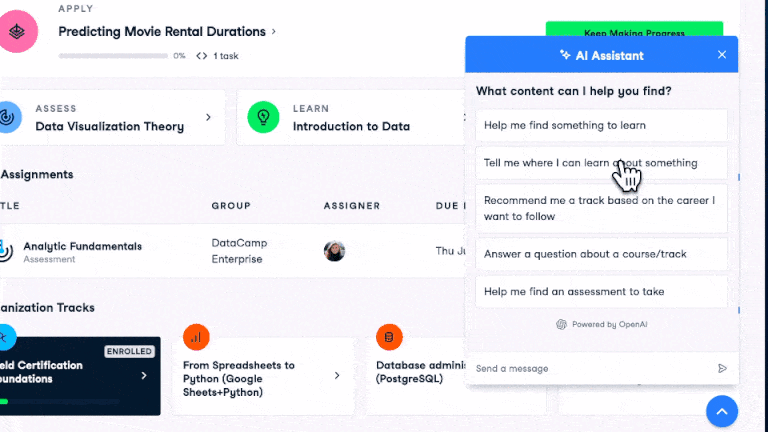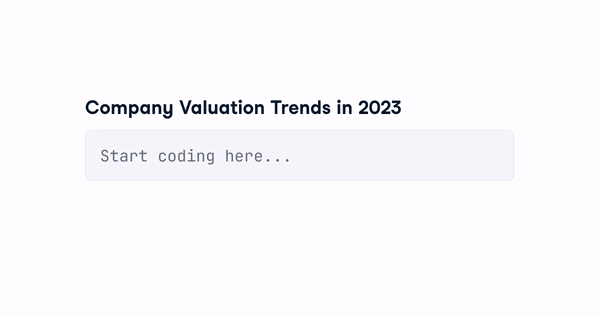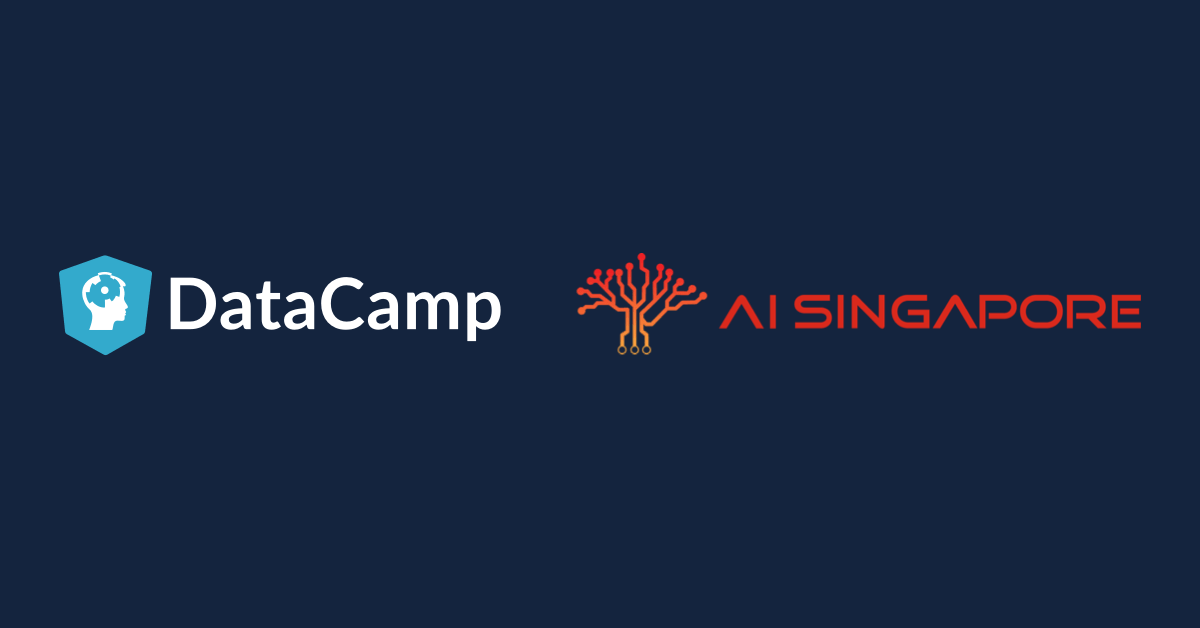

We live in a world that currently generates 2.5 quintillion bytes of data per day and counting. The number of mobile devices exceeds the number of people on the planet, and for many years now we’ve heard the sound bite that 90% of the data in the world was generated in the past two. The amount of untapped data across all industries is startling. Building infrastructure and tools to turn this data into insights and then using it to inform decision-making processes is an ever-present and growing challenge for every industry. This is equally true for equipping the workforce with the skill sets essential to manage and analyze all this data. At DataCamp, we see our customers, partners, and collaborators using a range of approaches to address these challenges.
I recently got excited about AI Singapore’s strategy when chatting with Laurence Liew, Director of AI Industry Innovation at AI Singapore, for our podcast DataFramed. This interview, which I plan to release when DataFramed returns, was a whirlwind tour through the current state of technology and AI in Singapore and how AI Singapore is working with DataCamp to make the nation as AI-driven as possible, among many other things.
AI Singapore's stated mission is to:
Anchor deep national capabilities in artificial intelligence, thereby creating social and economic impact, grow local talent, build an AI ecosystem, and put Singapore on the world map through the three pillars of AI research, AI technology and AI innovation.
One of the things I find exciting about their approach is that they recognize the deep challenges that exist in (i) making sure that cutting edge research gets in the hands of industry practitioners and (ii) educating an entire workforce (and a future workforce) with respect to data science, machine learning and artificial intelligence tools and techniques.
Let’s drill down into the three pillars of AI research, AI technology, and AI innovation to see how AI Singapore is thinking about bridging these gaps between (i) research and industry and (ii) the workforce and the data skills necessary for modern industry in the 21st century.
AI Research: Seeding High Quality
The AI Research pillar’s goal is to seed high-quality research efforts that develop fundamental and novel AI techniques, algorithms, and adjacent technologies—efforts that will eventually contribute significantly to the other pillars of AI Singapore. AI Singapore’s research program also encourages national research collaborations and nurtures local AI talents.
Priority research areas include:
- Explainable AI
- AI in design
- AI in sensemaking
- AI-Human collaboration
- Training on small datasets
The last one is particularly important for Singapore. Being a small country, the human-generated datasets will be small compared to more populous countries, so it is important that their researchers advance this field of AI research. In short, this pillar provides the foundation for future AI work by recognizing the importance of ongoing research in developing technologies that will be adopted by industries downstream.
AI Technology: Tackling Grand Challenges
This pillar looks at what AI Singapore calls grand challenges ─ the class of problems that are really difficult and that AI could be used (as one of several technologies) to help solve. Grand challenges (i) need to be impactful, (ii) need to affect each and every person in Singapore, and (iii) must be measurable.
Under the grand challenges, AI Singapore has prioritized four verticals: healthcare, education, cities and smart nations, and finance. Think about these as the four big problem statements they're keen to tackle.
As a teaser, let’s now explore the first vertical, healthcare (you’ll have to wait until the other three challenges launch for the rest). The Healthcare Grand Challenge asks “How do we reduce the three highs by 20% over the next five years: high blood pressure, high cholesterol, and hyperglycemia (or diabetes)?” The Healthcare Grand Challenge has been launched and, in fact, just two weeks before I spoke with Laurence, they had the award ceremony to announce the three teams that received the initial grant to do the grand challenge.
“The three highs, high blood pressure, high cholesterol, and diabetes are a big, big concern for the Singapore government. They’re straining the healthcare systems and the budget here. We hope that with AI we can try to at least mitigate some of the impact.” This pillar intends to demonstrate the lasting impact modern AI can have on these grand challenges.
AI Innovation: Solving real-world problems
The AI Innovation pillar includes a set of programs and strategies to get cutting-edge AI research techniques into the hands of industry partners to solve real-world problems.
The flagship program under AI Innovation is the 100 Experiments program, in which companies propose a business problem or challenge to AI Singapore that they think data science, machine learning or AI could be used to solve. AI Singapore performs a systematic review of each proposal. If they think it's an interesting problem with no existing commercially available solution or technology partners that can help them, they then step in and core fund the project (further details and more about the application process can be found here).
What does this look like? AI Singapore contributes \$250,000 SGD to each project (\$180,000 USD), which the company matches 1:1. Laurence has a KPI of executing 100 projects, hence the name 100 Experiments, with the total program funding of \$25 million SGD.
Since they started in June 2017, they have approved 40 projects and, due to the success of the program, they have received a second round of government funding to bring the number of projects to 200. There are already projects in healthcare, manufacturing, IoT, anomaly detection, procurement and finance, among others.
The goal for each experiment is to produce a minimum viable product (MVP) within nine to 18 months. This requires cooperation from both sides to work together to develop the MVP which the company can then take and deploy back into their organization. The funding supports a project team that includes researchers from local universities in Singapore and engineering resources from AI Singapore, including what they call AI Apprentices. Laurence told me that it is relatively straightforward to get professors involved, but they also need AI engineers to work on the MVP. This is where education around the rapidly evolving ecosystem of data science, machine learning and AI techniques, tooling, and applications in industry comes into play.
The AI Apprenticeship Program: Training Future Leaders
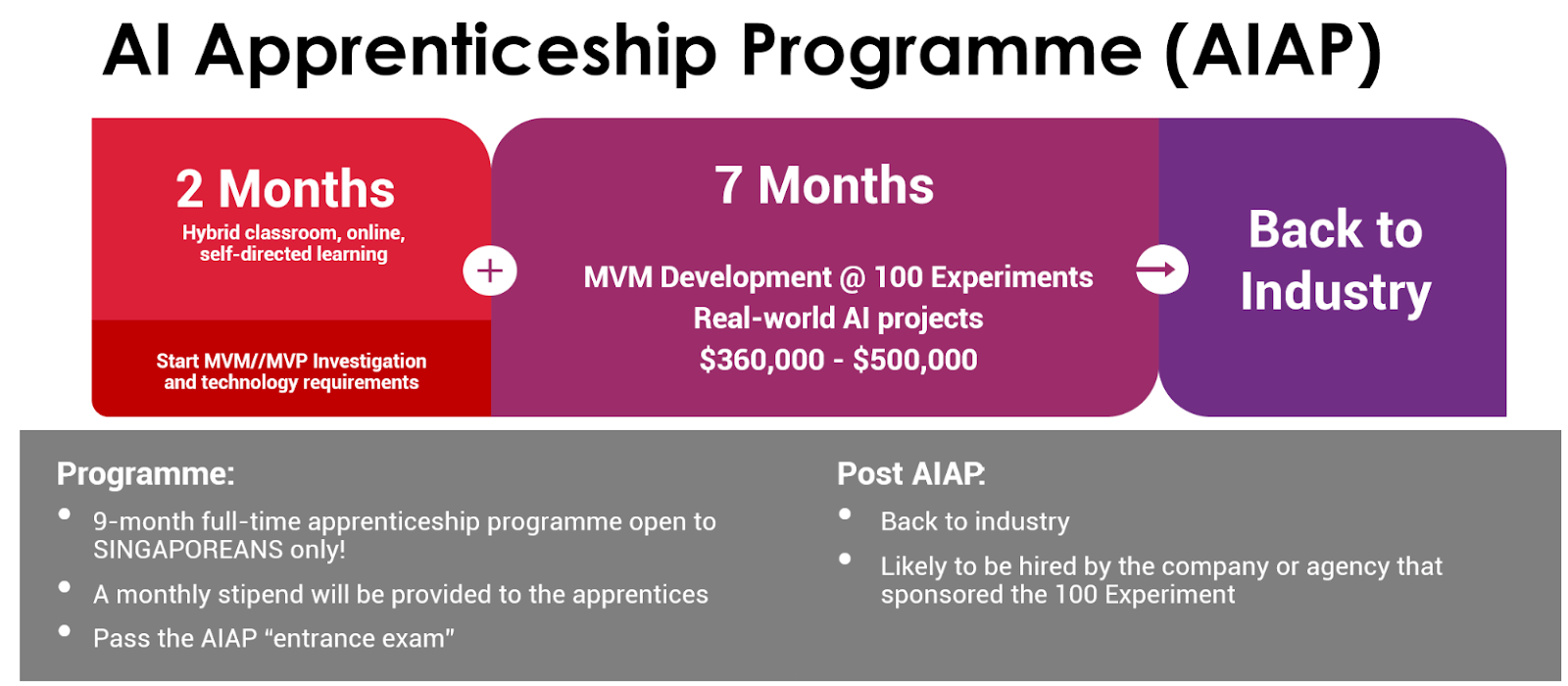
To help build the workforce required to support industry’s current and growing AI needs, AI Singapore created the AI Apprenticeship program. This gives Singaporeans with basic knowledge the opportunity to deep skill themselves. The program combines learning through DataCamp courses and other resources with real-world experience gained through projects under the 100 Experiments program.
This apprenticeship program has taken off quickly. It’s one of AI Singapore’s core programs, coupled with the 100 Experiments program (in which every experiment has two apprentices).
The apprenticeship program is full-time, paid, for nine months. AI Singapore pays each apprentice a monthly stipend of \$3,000 to \$5,000 SGD (there’s no cost to participate). Laurence told me that the AI apprenticeship program is helping to solve their AI engineering challenge for the next 10 years. However, upskilling, reskilling, and deep skilling a nation doesn’t stop there. They need to uplift the technical skill sets of industry in general, and that's how they came up with the idea of AI for Industry.
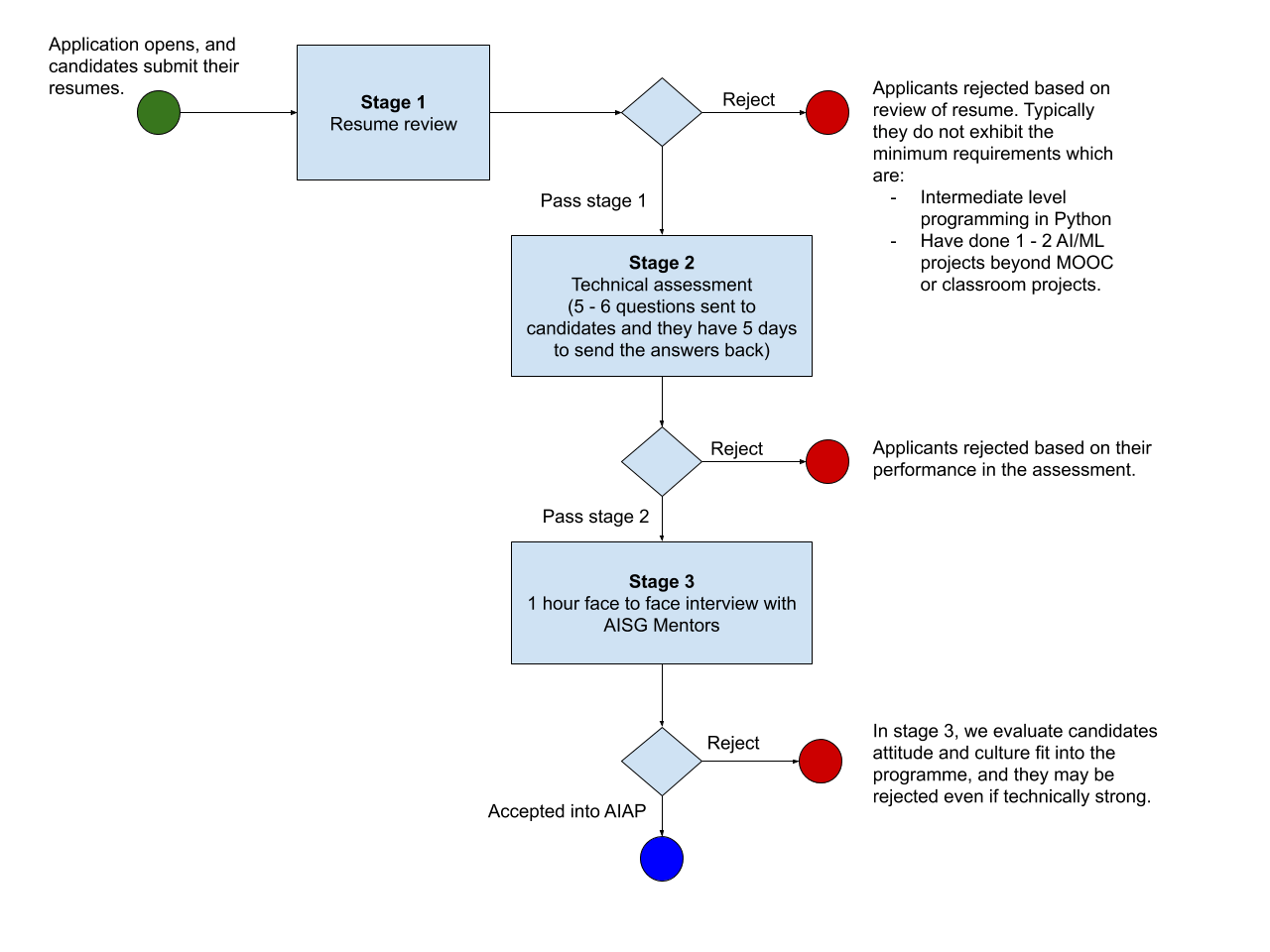
AI for Industry: Democratizing Skills
AI for Industry’s goal is to uplift the technical skill sets of those working for organizations across a range of verticals. AI Singapore partners closely with DataCamp for this program. It builds on their AI for Everyone program, which is a 3-hour workshop to introduce anyone to modern AI technologies and applications so that they can be savvy consumers of AI products and services. In AI for Everyone, participants learn how to identify opportunities and potential use cases in their work and daily lives. They also build a simple AI model with online tools! One of AI Singapore's mandates is to enable not only companies, but working professionals and everybody else, to be AI ready. AI for Everyone is the evolving result of this mandate.
AI for Industry combines AI for Everyone with DataCamp’s Data Scientist with Python track, which is a 100-hour collection of courses that covers everything from Python foundations to importing, cleaning and munging data to statistics, machine learning, SQL, package management, data visualization, and much more. Participants take this track over 12 months. AI Singapore curates a monthly newsletter aligned with courses in the track and leads a three-hour hands-on machine learning workshop. Laurence said they decided to use the DataCamp Data Scientist with Python track as a focal point for the program because “the thinking behind it is how the training should be done.”
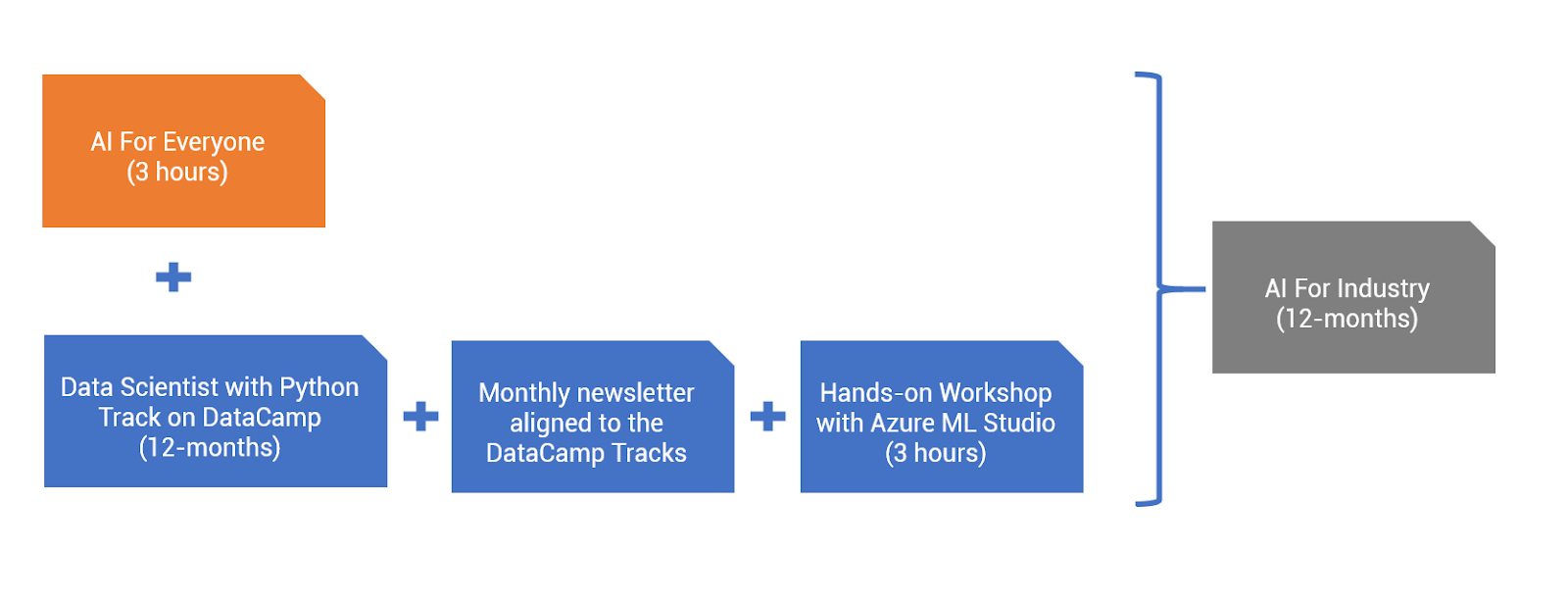
But the education doesn’t stop there. What about students who are not yet in industry? That’s where AI for Students comes into play.
AI for Students: Empowering the Next Generation with AI Fluency
When Laurence realized that DataCamp had been offering free access to the DataCamp platform for universities, professors, and students, he wondered whether they could tap into that and formalize the program so that AI Singapore could help get more students onboard.
“Why should we stop at just the university students? Can we open it up all the way to secondary school kids?”
In Singapore, kids in primary and secondary schools are already learning Python—so why should they begin formalizing Python training at the university level? To test whether his theory could be workable, Laurence got his son to take the Data Scientist with Python track on DataCamp.
Laurence reported back: “He finished it. He passed. He's working on projects in school. The interesting thing was that he completed that when he was 13 years old. A smart kid that really enjoys programming. We have lots of them in Singapore. They can go through those modules. I thought, if he can do it, I'm sure a lot of other kids can do it.”
Following this familial pilot, Laurence worked closely with DataCamp, and we announced and launched the program last November. At the time of our conversation, AI Singapore had 7,000 students signed up for AI for Students, coming not just from universities, but from polytechnics and secondary schools, among others. Several months on, they now have 11,000 students! Laurence told me that the program has been of tremendous interest for school teachers who want to train their kids on the platform after classroom hours using Python, data science, AI, and machine learning.
Laurence stated explicitly that the AI for Students program is essentially pure DataCamp. AI Singapore’s role is going out there to say, "Hey, we have this platform. It's free. You, as a teacher, come to us and say, 'I've looked at the DataCamp platform. I really like it. I want to do modules 1 to 10.'" Then AI Singapore will work with DataCamp on the back end to provide that to the teacher.
On a more personal note, this news means a great deal to me. My first role at DataCamp was essentially to build out the base Python data science curriculum, so much of my first 18 months here was invested in the Data Scientist with Python track. A lot of blood, sweat and tears went into this track, as we grew from a 10-person company to 50 people (Today, we have 140+ employees!). It involved a huge amount of work from our external instructors and internal content, engineering, product, and marketing teams. To hear that this track is now being used, free of cost, to educate 11,000 Singaporean students, including children, really has me on cloud nine.
Eyes on the future
Even more exciting is what’s in store for the future: DataCamp has recently agreed to support 100,000 students in the classroom, and the new AI for Industry collaboration is now tasked with enabling 25,000 working professionals in Singapore to become AI proficient. AI Singapore will continue to base AI for Industry heavily on DataCamp's Data Scientist with Python track to provide participants the basic skills and knowledge to be data fluent and AI proficient. This is a collaboration to keep your eyes on.
| Program | Description |
|---|---|
| AI Research | Seeds high quality research efforts aimed at developing fundamental AI novel techniques, algorithms, and adjacent technologies—efforts that will eventually contribute significantly to the other pillars of AI Singapore. This research program encourages national research collaborations and nurtures local AI talents. |
| AI Technology | Supports what AI Singapore calls grand challenges, the class of problems that are really difficult and that AI could be used to solve. Grand challenges (i) need to be impactful, (ii) need to affect each and every person in Singapore, and (iii) must be measurable. AI Singapore has prioritized four verticals: healthcare, education, cities and smart nations, and finance. |
| AI Innovation | A set of programs and strategies to get cutting-edge AI research techniques into the hands of industry partners to solve real-world problems. The flagship program under AI Innovation is the 100 Experiments program, where companies come to AI Singapore with a business problem or challenge that they think data science, machine learning, or AI could be used to solve. |
| The AI Apprenticeship Program | Helps build the workforce to support industry’s current and growing AI needs, AI Singapore created the AI Apprenticeship program. This gives Singaporeans with basic knowledge the opportunity and access to develop deeper skills on their own time. The program combines learning through DataCamp courses and other resources with real-world experience gained through projects under the 100 Experiments program. |
| AI for Industry | Uplifts the technical skill sets of working professionals across verticals AI Singapore partners closely with DataCamp for this program. |
| AI for Everyone | A three-hour workshop to introduce anyone to modern AI technologies and applications so they can be savvy consumers of AI products and services. |
| AI for Students | A program to empower the next generation with AI fluency. This program provides students from secondary schools, polytechnics, and universities with free access to DataCamp's 100-hour Data Science with Python track. |
